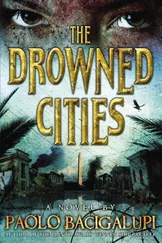J. Ballard - The Drowned World
Здесь есть возможность читать онлайн «J. Ballard - The Drowned World» — ознакомительный отрывок электронной книги совершенно бесплатно, а после прочтения отрывка купить полную версию. В некоторых случаях можно слушать аудио, скачать через торрент в формате fb2 и присутствует краткое содержание. Жанр: Фантастика и фэнтези, на английском языке. Описание произведения, (предисловие) а так же отзывы посетителей доступны на портале библиотеки ЛибКат.
- Название:The Drowned World
- Автор:
- Жанр:
- Год:неизвестен
- ISBN:нет данных
- Рейтинг книги:3 / 5. Голосов: 1
-
Избранное:Добавить в избранное
- Отзывы:
-
Ваша оценка:
The Drowned World: краткое содержание, описание и аннотация
Предлагаем к чтению аннотацию, описание, краткое содержание или предисловие (зависит от того, что написал сам автор книги «The Drowned World»). Если вы не нашли необходимую информацию о книге — напишите в комментариях, мы постараемся отыскать её.
The Drowned World (brought back into print by Millenium's SF Masterworks line) was Ballard's first major published novel. For Ballard enthusiasts, it's a fascinating read, for it prefigures many of the themes that pervade his subsequent books: planetary/ecological disaster, entropy, the devolution of human nature, a preoccupation with the roots of violence. For those who aren't familiar with Ballard, it's a good introduction-more accessible and less transgressive than some of his later work, yet full of the arresting surrealism and hallucinatory brilliance of language that are hallmarks of his writing.
The Drowned World posits (presciently, as it turns out) that the world has been overwhelmed by a catastrophic greenhouse effect. It differs from our own impending disaster in that it's natural rather than man-made. In Ballard's scenario, violent solar storms have depleted the outer layers of Earth's ionosphere; as these vanish, temperature and solar radiation begin to climb, melting the polar ice-caps. This enormous outflow of water carries with it tons of topsoil, damming up the oceans and entirely changing the contours of the continents, drowning some parts of the world and landlocking others. At the same time, the increased radiation produces freak mutations in Earth's flora and fauna, initiating a new biological era reminiscent of the Triassic period, in which reptiles and giant tropical plants were the dominant forms of life.
The harsh environment and a decline in mammalian fertility have drastically reduced the world's human population. Still, life goes on, including survey expeditions sent out to map inundated areas for possible reclamation. The novel focuses on one of these expeditions, which for several years has been exploring the series of giant lagoons that used to be Europe. The expedition's personnel have been at it so long that the activity has ceased to mean very much; daily, they sink deeper into lassitude and indifference. Also, some of them have begun having strange dreams, of a primeval swamp dominated by a huge burning sun that pulses to the rhythm of their own heartbeats.
These dreams, it turns out, aren't random occurrences or signs of stress, but the first warning of a much deeper process. Human beings, responding to stimuli embedded in their genetic makeup billions of years earlier, are beginning to devolve. The dreams aren't dreams at all, but memories of the primeval ooze from which life first emerged. As the Earth is moving back through geophysical time, the dreamers are moving back through "archaeopsychic" time, recapitulating in reverse each of the stages of human evolution. Is this an odyssey toward a new Garden of Eden? Or does it presage the extinction of humankind?
In some ways, The Drowned World is not a very satisfactory novel. It's episodic and rather slow, and its various parts don't always seem to mesh. Starting as a biological mystery, it veers suddenly into a bizarre Heart of Darkness scenario, complete with a mad white hunter and his hordes of native soldiers, and then returns with equal abruptness to the speculative concerns of the beginning. Too, Ballard is more concerned with setting and atmosphere than with character and verisimilitude. The protagonist, Kerans, is a cipher; many of the other characters are the merest sketches. The logistical issues that most speculative fiction writers toil over-where the expedition gets food, for instance, or how it purifies water-are never addressed.
Yet Ballard's vision of planetary and psychic change, as well as his brilliant descriptions of the altered earth, possess a surreal consistency that lifts The Drowned World beyond its structural peculiarities, making it a work of real power. One can feel the heat, see the jungles spilling over the roofs of the inundated hotels and apartment buildings, hear the screams of the iguanas and the giant bats. These oppressive, hypnotic images have the solidity of something very deeply conceived; they seize the reader's imagination in the same way that the devolutionary dreams seize the psyches of the book's characters. Perhaps it's no accident that these characters and their struggles seem shadowy by comparison to the vivid landscape in which they move. This is part of Ballard's message: humankind is impermanent, but time and nature endure.











